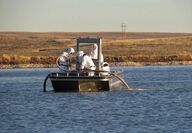Sorted by date Results 1 - 4 of 4
No humans have been infected during the outbreak in south-central Wyoming, though officials advise people to avoid dead animals with no obvious injuries. One moose and more than 50 cattle have died of anthrax in the past month in south-central Wyoming, officials confirmed Wednesday. Anthrax occurs naturally in soil but has not been documented in Wyoming in livestock since the 1970s and in wildlife since 1956. No humans have been infected, according to the Wyoming Department of Health. Wildlife and veterinary health officials ask that anyone in...

In September, the Wyoming Game and Fish Department applied 14,000 pounds of a chemical called rotenone to kill anything with gills in Saratoga Lake. It's a naturally derived chemical used commonly to control fish species around the globe. The good news is it only kills species with gills - so isn't harmful to humans, dogs, cows or other critters. The bad news is it kills everything with gills. September wasn't the first time fisheries biologists used rotenone in Saratoga Lake, and it likely...
When it comes to animals, not comic book characters, few wolverines are as famous as wolverine M56. Over the course of a few years, the badger-sized animal with claws meant for digging and teeth meant for ripping wandered from the Tetons to Rocky Mountain National Park in Colorado to North Dakota, where he was shot by a ranch hand unsure of the strange animal approaching his cows. Wolverine M56 made headlines because his radio transmitter allowed biologists to track the epic journey, which spanned hundreds of miles. But those kinds of...
Up close, the spiny softshell turtle looks a little like a leather pancake, but few people get that kind of glimpse. In most sightings, they likely resemble an alligator, with only a long nose and pair of eyes poking out of the water, waiting for food to wander by. If they see or hear you before you see or hear them, they’re gone. They’re not social creatures, especially not with humans. But don’t mistake their skittishness for cowardice, said Brian Tornabene, a postdoctoral researcher at the University of Montana who spent years study...